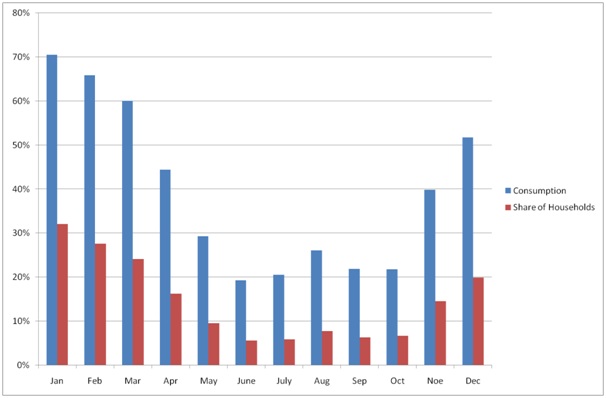Consumption of Electricity by Households Connected to the EVN Bulgaria Electricity Distribution EAD Grid in 2009-2014
| complete text of the report |
Summary
15 June 2015
The Energy and Water Regulatory Commission (EWRC) in Bulgaria has traditionally kept the regulated price of electricity for households low, defending its position with the so-called “socially acceptable” price of energy. At the same time the Commission presents no arguments in favor of their view – what is the socially acceptable price, how many households are unable to make ends meet with the current prices, what are the reasons leading to a difficulty in payment and so on. The Commission’s efforts do not include finding alternative ways to reduce electricity bills through finding alternative sources for household heating or improving the management of social benefits for heating. Rather its energy is directed in one direction – keeping electricity prices low.
The debate on whether households can pay their bills is dominated by price talks and not enough attention is directed towards electricity consumption as the bills are a function of both. Analyzing the data for household electricity consumption in the period 2009-2014 shows that the average annual share of households with low and medium consumption (up to 500 KWh per month) is around 85% and their share of consumed electricity is around 61%. At the same the average annual share of households with high electricity consumption (above 500 KWh per month) is around 15%, while the share of their consumed energy is around 39%. In other words, a relatively small share of households consumes a disproportionately large share of the total electricity consumption. The disproportion is even more evident during the heating season – in November 15% of households consume 50% of the total household electricity consumption, while in January 32% of households consume 70% of the total household electricity consumption.
Share of households with monthly consumption of up to 500 KWh (excluding households with 0 consumption) and the share of their consumption in total household consumption, monthly averages for the period 2009-2014

Source: EVN Bulgaria Electricity Distribution
Energy Poverty
Policies to combat poverty and support disadvantaged groups do not fall into the jurisdiction of the the Energy and Water Regulatory Commission, but rather should be a main priority of the Ministry of Labor and Social Policy. Judging by the government subsidies/assistance for heating with electricity, there seems to be a mismatch between the assessment of the extent of energy poverty in the country made by the Ministry and by the Commission. While EWRC quotes data from the World Bank, according to which 61% of households in the country fall into the energy poverty category, in the period 2011-2015 only between 19 and 22 thousand households have received subsidies/assistance for heating with electricity out of 3 million households in the country according to the last Census survey.
Although there is a difference between income and energy poverty, policies in Bulgaria are still lagging in recognizing and addressing it. The World Bank data is based on an outdated methodology, which was used in the EK until 2013, when it was replaced by a new definition. The latter states that a household is fuel poor if:
- They have required fuel costs that are above the median level; and
- Were they to spend that amount they would be left with a residual income below the official poverty line.
Without a doubt, the EWRC can play a major role in developing a country-specific methodology for Bulgaria, which can measure the scope, and, if possible, the degree, of energy poverty in the country. However, the Commission must abstain from using the regulated prices of electricity as a tool to support the energy poor households in the country as this is against both the logic and the letter of the letter of both the European and Bulgarian legislation.


